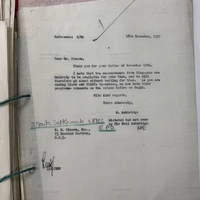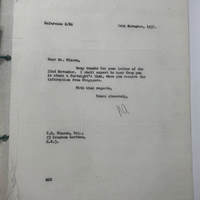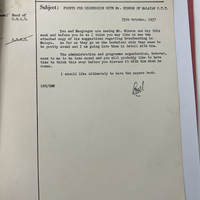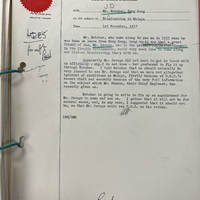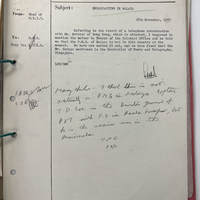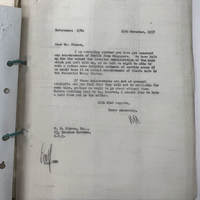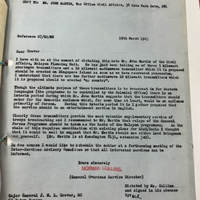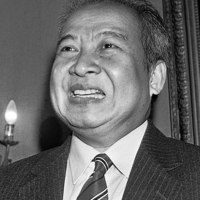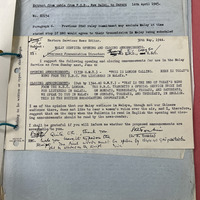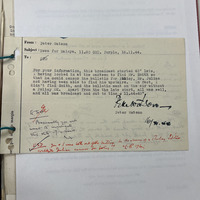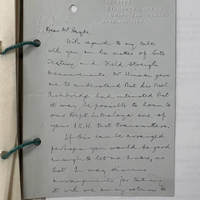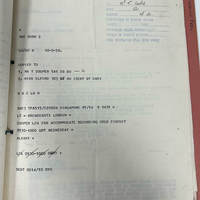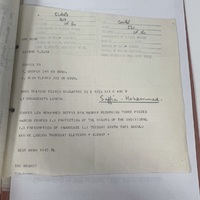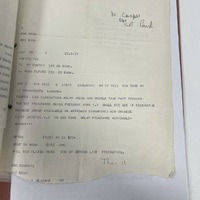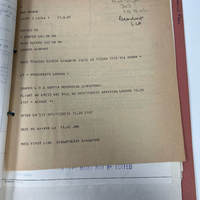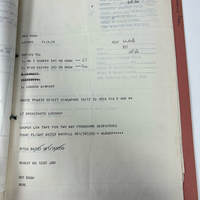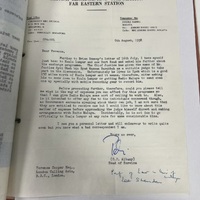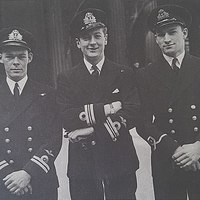Search
787 items
-
Music (Instrumental) |Topic: Culture |Audio
-
Music (Instrumental) |Topic: Culture |Audio
-
Negara Ku unfolds as a musical ode to Malaysian heritage, marked by unestablished instrumentation, presumably harmonium, violin, and percussion. Executed by unidentified performers, this piece provides an auditory lens into the nuanced expressions embedded within Malaysian national music. More »Music |Topic: Culture |Audio
-
In a news bulletin from March 26, 1949, the complete edition of LP 2200 Hrs News covers a range of events including the results of the Grand National and Boat Race, the Liberal Party Assembly, a speech by Princess Elizabeth, and foreign news. The bulletin highlights a customs treaty between France and Italy, a protest to Czechoslovakia against the expulsion of a British Military Permit Officer, and worsening relations between the Soviet Union and Iran. Additionally, the bulletin includes sports news such as the FA Cup semi-finals and the Rugby Union international between France and Wales. Princess Elizabeth also calls on wartime colleagues to serve again as territorials. The weather forecast for southern England is also included, with the warmest day of the year reaching 67 degrees in London. More »Spoken voice |Topic: Politics |Audio
-
Ngô Đình Nhu; 7 October 1910 – 2 November 1963; baptismal name Jacob) was a Vietnamese archivist and politician.[1] He was the younger brother and chief political advisor of South Vietnam's first president, Ngô Đình Diệm. Although he held no formal executive position, he wielded immense unofficial power, exercising personal command of both the ARVN Special Forces (a paramilitary unit which served as the Ngô family's de facto private army) and the Cần Lao political apparatus (also known as the Personalist Labor Party) which served as the regime's de facto secret police. More »Person
-
The BBC National Programme has re-recorded the extract "Nine Days Wonder" onto a Betamax cassette stereo from its original issue no. BBC Archive LP330. The recording features speakers Bobbie Comber, Anona Wynn, Lupino Lane, and Cyril Smith, as well as Sydney Baynes and his Band. The original recording took place at Radiolympia and includes a mix of male and female speakers. More »Spoken voice |Topic: Culture |Audio
-
Sir Noel Ashbridge KBE (10 December 1889 – 4 June 1975) was an English engineer who played a key role in the early technical development of the British Broadcasting Corporation. More »Person
-
Correspondence on field strength measurements. Informs V.H. Winston that they will continue their work without them. More »Message
-
Response to V.H. Winston's letter regarding soil samples thaking him for his efforts. More »Message
-
Sender writes receiver, attaching documents containing Mr. Winston's suggestions on broadcasting in Malaya. Done preceding a meeting which the reciever and Macgregor(named in letter) have with Mr. Winston. Letter has two policies signed by two different people initals LWH and GMM More »Message
-
Sender recounts a conversation with a Mr. Butcher where they discussed the Postmaster General's (a Mr. savage) intention to set up a meeting between them. More »Message
-
Refers to a conversation between the sender and Mr. Butcher in which they attempt to meet with the P.M.G. of Malaya More »Message
-
Sender requests field measurements from a V.H Winston. This is done to an estimate of 'Service areas' More »Message
-
Norman Collins writes to JML Grover on possible locations and planning for new shortwave and mediumwave transmitters. He also states, on programming language, that temporarily they should cater their entertainment programming to domestic armed forces, therefore in English. More »Message
-
Norodom Sihanouk (; 31 October 1922 – 15 October 2012) was a Cambodian statesman, Sangkum and FUNCINPEC politician, film director, and composer who led Cambodia in various capacities throughout his long career, most often as both King and Prime Minister of Cambodia. In Cambodia, he is known as Samdech Euv (meaning "King Father"). During his lifetime, Cambodia was under various regimes, from French colonial rule (until 1953), a Japanese puppet state (1945), an independent kingdom (1953–1970), a military republic (1970–1975), the Khmer Rouge regime (1975–1979), a Vietnamese-backed communist regime (1979–1989), a transitional communist regime (1989–1993) to eventually another kingdom (since 1993). Sihanouk was the only child of Prince Norodom Suramarit and Princess Sisowath Kossamak, daughter of King Sisowath Monivong. When his grandfather Monivong died in 1941, Sihanouk became king amidst French colonial rule. After the Japanese occupation of Cambodia during World War II, he secured Cambodian independence from France in 1953. He abdicated in 1955 and was succeeded by his father, Suramarit, so as to directly participate in politics. Sihanouk's political organization Sangkum won the general elections that year, and he became prime minister of Cambodia. He governed the country under one-party rule and suppressed political dissent. After his father died in 1960, Sihanouk assumed a new position as Chief of State of Cambodia. Officially neutral in foreign relations, Sihanouk was closer to the communist bloc in practice. The 1970 Cambodian coup d'état ousted him, and he fled to China and North Korea, forming a government-in-exile and a resistance movement there. He encouraged Cambodians to fight the new government and backed the Khmer Rouge during the Cambodian Civil War. He returned as figurehead head of state after the Khmer Rouge's victory in 1975. His relations with the new government soured, and in 1976 he resigned. He was placed under house arrest until Vietnamese forces overthrew the Khmer Rouge in 1979. Sihanouk went into exile again and in 1981 formed FUNCINPEC, a resistance party. The following year, he became president of the Coalition Government of Democratic Kampuchea (CGDK), a broad coalition of anti-Vietnamese resistance factions which retained Cambodia's seat at the United Nations, making him Cambodia's internationally recognized head of state. In the late 1980s, informal talks were carried out to end hostilities between the Vietnam-supported People's Republic of Kampuchea and the CGDK. In 1990, the Supreme National Council of Cambodia was formed as a transitional body to oversee Cambodia's sovereign matters, with Sihanouk as its president. The 1991 Paris Peace Accords were signed, and the UN Transitional Authority in Cambodia (UNTAC) was established the following year. The UNTAC organized the general elections in 1993, and a coalition government, jointly led by his son Norodom Ranariddh and Hun Sen, was subsequently formed. Sihanouk was reinstated as Cambodia's king. He abdicated again in 2004, and the Royal Council of the Throne chose his son Sihamoni as his successor. Sihanouk died in Beijing in 2012. Between 1941 and 2006, Sihanouk produced and directed 50 films, some of which he acted in. The films, later described as being of low quality, often featured nationalistic elements, as did a number of the songs he wrote. Some of his songs were about his wife Monique, the nations neighboring Cambodia, and the communist leaders who supported him in his exile. In the 1980s, Sihanouk held concerts for diplomats in New York City. He also participated in concerts at his palace during his second reign. Sihanouk is remembered for his role in shaping modern Cambodia, particularly in leading the country to independence, although his reputation was damaged by his association with the Khmer Rouge in the 1970s. (Wikipedia) More »Person
-
In the archive, there is a tape reel labeled "On Korea and the Korean War, 1950-1953" and an Electronic World recording on a 17 cm reel. The tape reel likely contains recorded material related to the Korean War, while the Electronic World recording is stored on a smaller medium. This suggests that the archive contains historical audiovisual material related to Korea and electronic technology from the specified time periods. More »Spoken voice |Topic: Military Conflict |Audio
-
G.H Tonkin suggested the opening and closing script and stated that he is of the opinion that the Malay audience do not like hearing a womans voice, and that the script should be read by the news-reader. More »Message
-
The telegram states that the broadcast 1130 GMT slot started 45" late, and that Mr. Smith could not be found, resulting in the broadcasting of the entire bulleting out of time and without policy approval. More »Message
-
Letter from unknown sender requesting an 1 K.W transmitter in order to complete field strength tests. More »Message
-
In a recording from September 30, 1960, ornithologist, biologist, sociologist, explorer, journalist, author, and filmmaker Tom Harrisson discusses his role as the founder and Chairman of Mass-Observation. The interviewer and producer, Stewart Wavell, takes a minimal role in the recording. The script and asset ID for the recording are also provided. Harrisson is described as someone "living among strange people and listening to them talking about themselves; collecting strange objects." The recording is part of the People Today series. See also LP26304 for more information about Mass-Observation. More »Spoken voice |Topic: Culture |Audio
-
Peter Albany writes to BBC London that they can accommodate recording of the Radio Malaya contribution over circuit More »Message
-
Peter Albany writes to Terence Cooper that a replacement speaker has been secured, LCA Mohammed Suffia Bin Hashim. He also notes the topics he will be covering, and that the tape will arrive at the BBC London offices on the 11th of September 1958 More »Message
-
Peter Albany informs Terence Cooper that the Malaysian judge previously tapped to participate in the program has dropped out do to work pressure. He goes on to suggest potential replacements and suggests that the broadcast be delayed as well. More »Message
-
Peter Albany writes to Terence Cooper that Suffia's responses have been recorded and sent to Cooper via flight EM533, with expected arrival in London on September 21, 1958 More »Message
-
Peter Albany notes via telegram that their recording has been dispatched via air (flight number BA793) More »Message
-
Peter Albany proposes a potential speaker for the London Calling Asia joint broadcast with Radio Malaya; a Chief Justice from Ipoh named Justice Syed Sheh bin Syed Hassan Barakbah. He also inquires into a speaker fee for the contributors as well as potential coverage for expenses. More »Message
-
Lionel Peter Twiss OBE, DSC & Bar (23 July 1921 – 31 August 2011) was a British test pilot who held the World Air Speed Record in 1956. (Wikipedia) More »Person
Show filters +





